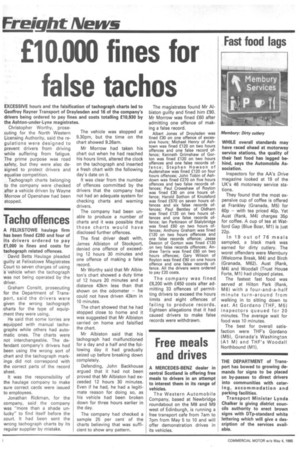E10.000 fines for false tachos
Page 16

If you've noticed an error in this article please click here to report it so we can fix it.
EXCESSIVE hours and the falsification of tachograph charts led to Geoffrey Rayner Transport of Draylesden and 16 of the company's drivers being ordered to pay fines and costs totalling £10,930 by the Ashton-under-Lyne magistrates.
Christopher Worthy, prosecuting for the North Western Licensing Authority, said the regulations were designed to prevent drivers from driving while suffering from fatigue. The prime purpose was road safety, but they were also designed to protect drivers and equalise competition.
Tachograph charts belonging to the company were checked after a vehicle driven by Wayne Morrow of Openshaw had been stopped. The vehicle was stopped at 9.30pm, but the time on the chart showed 9.26am.
Mr Morrow had taken his chart out when he had reached his hours limit, altered the clock on the tachograph and inserted a fresh chart with the following day's date on it.
It was clear from the number of offences committed by the drivers that the company had not had an adequate system for checking charts and warning drivers.
The company had been unable to produce a number of charts and it was possible that those charts would have disclosed further offences.
The first driver dealt with, James Albiston of Stockport, denied one offence of exceeding 12 hours 30 minutes and one offence of making a false record.
Mr Worthy said that Mr Albiston's chart showed a duty time of 12 hours 20 minutes and a distance 43km less than that shown on the odometer — he could not have driven 43km in 10 minutes.
The chart showed that he had stopped close to home and it was suggested that Mr Albiston carried on home and falsified the chart.
Mr Albiston said that his tachograph had malfunctioned for a day and a half and the following day it had gradually seized up before breaking down completely.
Defending, John Backhouse argued that it had not been proved that Mr Albiston had exceeded 12 hours 30 minutes. Even if he had, he had a legitimate reason for doing so, as his vehicle had been broken down for three hours earlier in the day.
The company had checked a sample 25 per cent of the charts believing that was sufficient to show any pattern.
The magistrates found Mr Al biston guilty and fined him £90. Mr Morrow was fined £60 after admitting one offence of making a false record.
Albert Jones of Droylsden was fined £30 on one offence of excessive hours; Michael Henry of Ashtown was fined £120 on two hours offences and one false record offence; Kenneth Grirnshaw of Gorton was fined £120 on two hours offences and one false records offence; Stephen Howson of Audenshaw was fined £120 on four hours offences; John Tobin of Ashdown was fined £270 on five hours offences and two false records offences; Paul Cmwshaw of Royton was fined £30 on one hours offence; Harold Sothon of Knutsford was fined £570 on seven hours offences and six false records offences; Paul Bentley of Oldham was fined £120 on two hours offences and one false records offence; Ian Parkinson of Stalybridge was fined £60 on two hours offences; Anthony Graham was fined £120 on two hours offences and one false records offence; Jesse Deacon of Gorton was fined £120 on two false records offences; Andrew Terris was fined £60 on two hours offences; Gary Wilson of Royton was fined £90 on one hours offence and one false records offence. All the drivers were ordered to pay £20 costs.
The company was fined £8,200 with £450 costs after admitting 33 offences of permitting drivers to exceed the hours limits and eight offences of failing to produce records. Eighteen allegations that it had caused drivers to make false records were withdrawn.




































































































